Related Research Articles
The Honda XR series is a range of four-stroke off-road motorcycles that were designed in Japan but assembled all over the world.

Victory Motorcycles was an American motorcycle manufacturer with its final assembly facility in Spirit Lake, Dickinson County, northwestern Iowa, United States. It began production of its vehicles in 1998, and began winding down operations in January 2017.
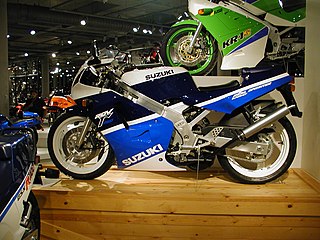
The Suzuki RGV250 (Gamma) was a Suzuki high performance sport bike which had a great number of its features and design cues based on Grand Prix technologies and ideas. It is a race-replica based on Suzuki's 250 cc (15 cu in) GP bikes from 1987 to 1998, the RGV Gamma V-2 racer. This motorcycle replaced the RG250 Gamma, which employed an alloy frame with a two-stroke parallel twin engine. The bike produced over 60 bhp in a narrow power band between 8,000 and 11,000 rpm. The dry weight ranged between 128 kg (282 lb) (1989) to 140 kg (309 lb) dry weight.

The Harley-Davidson Sportster is a line of motorcycles produced continuously since 1957 by Harley-Davidson. Sportster models are designated in Harley-Davidson's product code by beginning with "XL". In 1952, the predecessors to the Sportster, the Model K Sport and Sport Solo motorcycles, were introduced. These models K, KK, KH, and KHK of 1952 to 1956 had a sidevalve engine, whereas the later XL Sportster models use an overhead valve engine. The first Sportster in 1957 had many of the same details of the KH including the frame, fenders, large gas tank and front suspension.
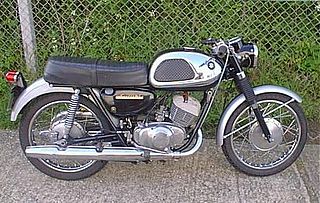
The Suzuki T20 is a motorcycle with a 247 cc (15.1 cu in), two-stroke, twin-cylinder engine, and six speed gearbox. It was first manufactured in 1965 and was produced until the end of the 1968 model year. Production peaked at more than 5000 units per month. It was superseded by an updated version which was designated the T250-1. An X6 is owned by comedian Jay Leno, and one segment of his web program called Jay Leno's Garage features his profile of the motorcycle.
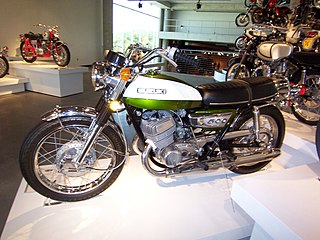
The Suzuki T series was a series of motorcycle manufactured by Suzuki that ran from approximately 1963 through 1977 in various engine displacements between 90 and 500 cc.

The 1981 Suzuki TS125 Dual Sport motorcycle is powered by a 123 cc 2-stroke cycle, air-cooled engine.

The MV Agusta 150 Sport RS was a motorcycle produced by the Italian motorcycle MV Agusta in their Cascina Costa plant from 1959 to 1969.
The MV Agusta 250B (Bicilindrica) was a motorcycle produced by the Italian manufacturer MV Agusta from 1968 to 1971. The motorcycle was first introduced at the 1965 Milan EICMA motorcycle show and was based on the stilborn MV 166 Arno GT. The model was discontinued in 1971 following the introduction of an overbored version, the 350B.
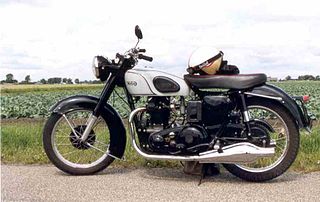
The Norton Model 7 Dominator was a 500 cc vertical twin motorcycle manufactured by the Norton Motorcycle Company from 1949 to 1955. It was the first of Norton's Dominator range of motorcycles. The engine was designed by Bert Hopwood and was a departure from Norton's previous practice of producing single-cylinder machines. The Model 7 was used in Japan as a police motorcycle.

The Norton Manxman was a 646 cc (39.4 cu in) air-cooled OHV parallel twin motorcycle made by Norton-Villiers from 1968 to 1970. It was the last Norton model to use the featherbed frame. Following the collapse of AMC and the subsequent formation of Norton Villiers, the company's focus had been on the new Norton Commando. There was a large inventory of parts from previous models that would not be used on the Commando, and to use up this stock the Mercury was conceived. The Mercury was introduced in October 1968 and around 750 machines were produced, most of the production going to the US. The model was also used by the Nigerian Police.
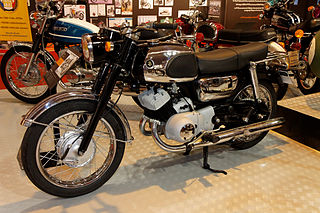
The Suzuki T10 is a 246 cc (15.0 cu in), two-stroke, twin-cylinder motorcycle produced by the Japanese Suzuki company between 1962 and 1967. The model was based on the earlier Colleda TT and had an improved frame. It was marketed as the El Camino in the US and was Suzuki's first twin the be sold in America.

The Suzuki T250, also known as the Suzuki Hustler is a 247 cc (15.1 cu in), two-stroke, twin-cylinder motorcycle produced by the Japanese Suzuki company between 1969 and 1972. The model was developed from the earlier T20 and was one of the models that contributed to Suzuki's success in the early 1970s.

The Suzuki GT250, also known as the Suzuki Hustler in the US is a 247 cc (15.1 cu in), two-stroke, twin-cylinder motorcycle produced by the Japanese Suzuki company between 1971 and 1981. The model was developed from the earlier T250, and was one of the best selling motorcycles in its class. For 1978 the bike was redesign and marketed as the GT250 X7. The X7 was capable of reaching 100 mph (160 km/h) in favourable conditions. The model range was discontinued in 1981 in favour of Suzuki's four stroke models, and the X7 was developed into the RG250 Gamma.

The Suzuki T350, also known as the Suzuki Rebel is a 315 cc (19.2 cu in), two-stroke, twin-cylinder motorcycle produced by the Japanese Suzuki company between 1969 and 1972. The model was based T305 and used an enlarged version of the T305 engine, which itself was an enlargement of the T20 unit. It was the fastest production 350 at the time. In 1972 a T350 won both the 500 class and was overall winner of the Australian Castrol Six Hour Production race at Amaroo Park but was subsequently disqualified. The model was dropped when the T380 triple was introduced in 1972.
The Suzuki T90, also known as the Suzuki Wolf is a 89 cc (5.4 cu in), two-stroke, twin-cylinder motorcycle produced by the Japanese Suzuki company between 1969 and 1972. The model was the only twin-cylinder machine in the class at the time. The T90 was radically styled and except for the engine size, the model was the same as the Suzuki T125.
Suzuki T125 was the designation given to two different models of 124 cc (7.6 cu in), two-stroke, twin-cylinder motorcycles produced by the Japanese Suzuki company between 1967 and 1971. The first shared the layout and styling of the 250 cc T20 and was produced in 1967 and '68. The second was more a more radical design that shared many parts with the smaller T90 and was produced from 1969 - '71.
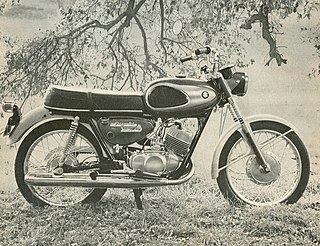
The Suzuki T200, also known as the Suzuki Invader and the X5 in the US is a 196 cc (12.0 cu in), two-stroke, twin-cylinder motorcycle produced by the Japanese Suzuki company between 1967 and 1971. The model was a scaled down version of the Suzuki T20.

The Suzuki T500, variously known as the Suzuki T500/Five, Suzuki Charger, Suzuki Cobra and the Suzuki Titan during its model life, is a 492 cc (30.0 cu in), two-stroke, twin-cylinder motorcycle produced by the Japanese Suzuki company between 1968 and 1975. The model was developed as a larger version of the Suzuki T20 which was intended to compete with the large-capacity British twins in the American market. When itroduced it was Suzuki's largest displacement machine. Overengineering of the engine led to the bike gaining a reputation for reliability, and being virtually bulletproof. A total of over 100,000 units were sold during the model's production.
The Ducati 160 Monza Junior is a 156 cc (9.5 cu in) single cylinder bevel drive SOHC motorcycle produced by the Italian manufacturer Ducati from 1964 to 1970. The model was the most successful of the Ducati OHC singles. The exact number produced is not known, but estimates put the figure between 13,000 and 15,000. This exceeds the total number of all other Ducati singles produced from 1967 to 1975.
References
- 1 2 3 4 5 "Suzuki T305 Road Test". Cycle World . 1968. Retrieved 18 September 2021– via www.suzukicycles.org.
- 1 2 3 4 5 Cooper, Steve (15 July 2019). "Suzuki T305". Classic Motorcycle Mechanics. Retrieved 18 September 2021– via www.pressreader.com.
- 1 2 Salvadori, Clement (26 February 2020). "Retrospective: 1968 Suzuki TC305 Laredo | Rider Magazine". ridermagazine.com. Retrieved 18 September 2021.
- ↑ "Bonhams : 1968 Suzuki TC305 Laredo Frame no. TC30510639". www.bonhams.com. Retrieved 18 September 2021.